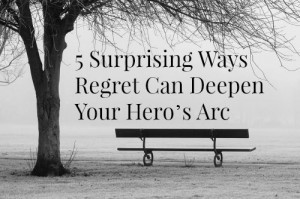5 Surprising Ways Regret Can Deepen Your Hero’s Arc
Super pleased to welcome Writing Coach MJ Bush today. I am a huge fan of her blog, Writing Geekery…if you don’t yet have this site on your writing resource roster, make it happen! (Trust me, you don’t want to miss any of her articles because they contain unique and valuable insight into character arc and story structure.)
MJ’s tackling REGRET, which is key to a well developed character arc. Regret can destroy a person, but it can also motivate, spurring a character to take action when they reach the point where fears, missed opportunities and poor choices lead to unbearable fulfillment and dissatisfaction. Great stuff here on how to use it in your hero’s arc, so please read on!
Regret is a hard motive to wrangle. Shallowness creeps in because actions seem simplistic or pasted on if you don’t establish realism and reader empathy.
Even if your reader wouldn’t be able to tell you exactly why it doesn’t seem realistic now, they’ll know realism when you use it.
And boy, can you use regret to change your character’s life in interesting ways. PLUS I’ve got some tips on creating emotional realism. Read to the end for my gift, a free report on arcs born from regret.
 First, let’s clarify what regret is.
First, let’s clarify what regret is.
It’s an indirect motivator. For example, it can fuel a desire to right wrongs, or a fear that the same thing will happen again.
It’s grieving for what could have been. Even if there was nothing you could have done.
But it also encompasses guilt, remorse, and contrition.
Basic regret is wishing things could have been another way, guilt is blaming yourself, remorse is wishing to make amends, and contrition is acting to make amends.
So, let’s look at five realistic ways regret can affect your character.
1. Looking Ahead Too Intently
Anticipated regret is stronger than the regret itself.
Your character might be disproportionately afraid of missing out, and realize later that it wasn’t so bad. The arc from fear to relief is an especially great option for supporting characters.
►► Avery had a ticket to leave on the next ship out, headed for one of the newly terraformed colonies, but he cut it too close and he can’t get everything ready in time. He transfered to a later launch, had more time to say goodbye, and realized that it was ultimately a good experience.
2. But It’s Not the Same!
This one applies when your character has missed an opportunity. The psychological phenomenon is called inaction inertia. One missed opportunity increases the likelihood of missing another, wishing it was as good as the first.
So make sure your character has a good strong push to take a second opportunity. Or let them pass up the second only to realize that they will really regret it if they miss a third.
…If you want them to take it.
►► Avery landed on his new planetary home and immediately found a great house, but decided to check out the possibilities. Nothing compared, but when he went back, it’d been sold. Later that week, he found another great place but he decided that the first house was his dream home and this other house just wouldn’t cut it.
Desperate after realizing that he should have taken it, he gave up and took the next livable place.
3. The Growth of Resilience (or Not)
Regrets can cause a distorted self-concept, the past reflecting on the self-worth.
It’s possible to learn to see the shame, the guilt, and the situations as trials intended to give you strength. And when your character learns to adopt this worldview, his entire outlook and self-concept will shift.
He will see himself as product of adversity, not the victim of it.
Or you can let one character wallow while another improves. I do like my foils.
►► Before moving to the stars, Avery always saw himself as a victim of his circumstances. His poor upbringing, the demeaning jobs, even the dead-end romantic relationships all fed the idea that the world was against him. When he started to realize that those things made him stronger, he started tackling bigger dreams and challenges.
Until, finally, he stepped on that ship.
4. Comparing Hurts Our Health (LINK)
As this article states, social comparison is a coping mechanism for regret. And the interesting thing is that it can have an effect on the character’s health.
It’s not just artistic license that has characters getting sick when they compare themselves unfavorably with others. Who knew?
►► Avery’s best friend Daniel slowly wasted away on Earth, alternately railing against the world and castigating himself for not stepping up like Avery.
5. Aged Regret = Different Flavor
We’re likely to regret actions in the short term, but in the long term it’s the things we didn’t do that get us down.
This can make a nice foil, with a younger character regretting an action and an older character regretting an “omission.” Or you can have a character arc from one to the other in the space of the story.
►► Years later, Avery forgot the decision to pass up the second house. Instead, he regretted not encouraging Daniel to see his own strength.
Show It Better Than a Movie
There’s more to regret than arcs and motivations. It’s an emotion, and as an author you need to treat it like one.
You see yourself as having lost something, or the idea of something that is profoundly meaningful to you, and the experience is every bit as real as suffering after any kind of traumatic event. – Suzanne Lachmann, Psy.D.
Your job is to show that grief. The resulting actions aren’t enough. Words spoken or thought aren’t enough.
You have to show a reaction to the pain.
Give it some screen time.
Let it sink in.
It’s Time to Give Your Characters the Depth They Deserve
You’ve got the tools to show your character’s regret, and to make it a realistically integral part of their actions and emotions. Especially if you have The Emotion Thesaurus .
.
Get to it.
HEADS UP! You can grab the free report Seven Arcs of Regret – ONLY AVAILABLE HERE – for more ideas and details. Download it now.
MJ Bush is The Analytical Creative. Her writing advice steps back to take in the whole picture, then dives in to grab the pearls of usable detail. She’s the founder of Writingeekery.com and a full time fiction coach, editor, and writer.
The post 5 Surprising Ways Regret Can Deepen Your Hero’s Arc appeared first on WRITERS HELPING WRITERS.
Writers Helping Writers
- Angela Ackerman's profile
- 1015 followers





